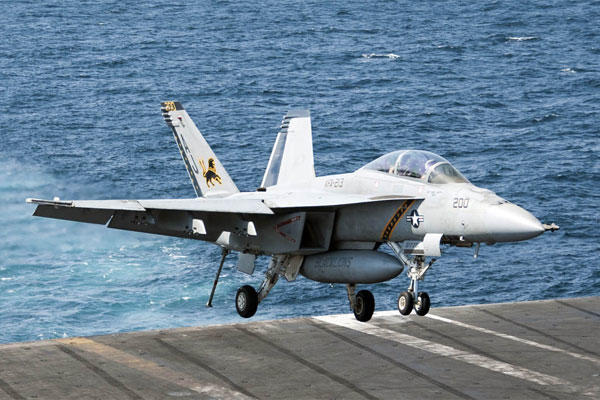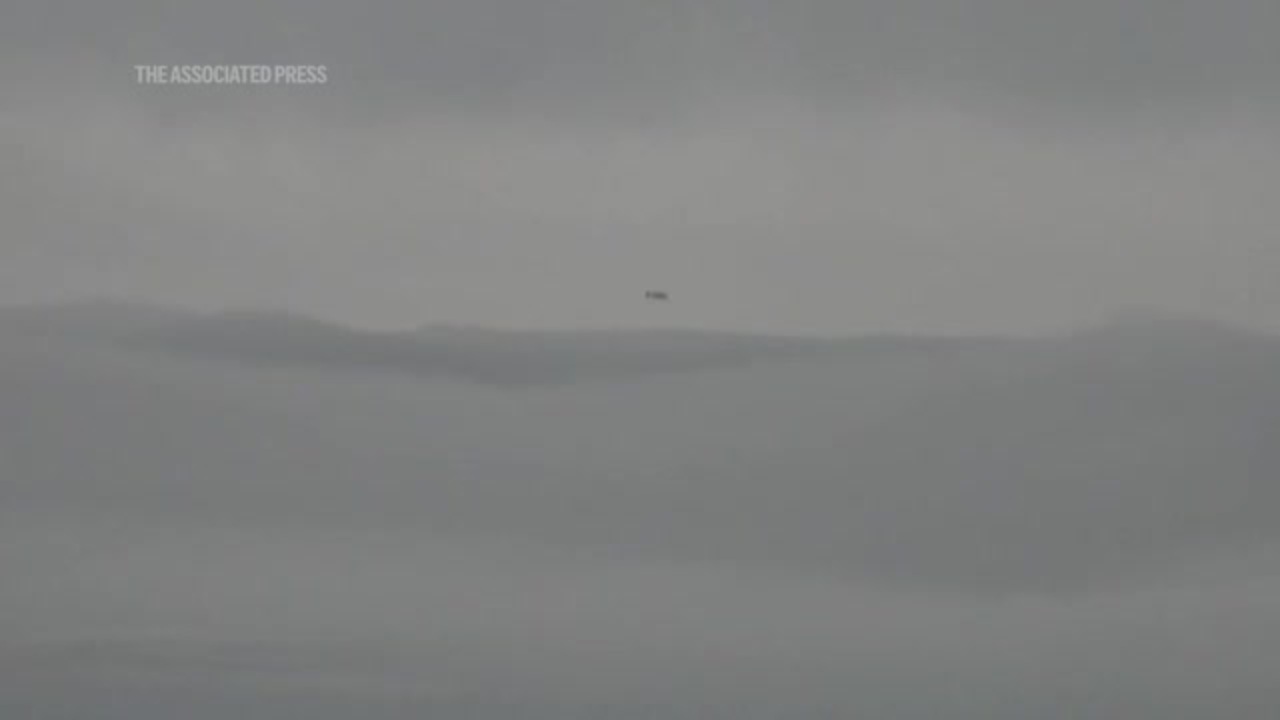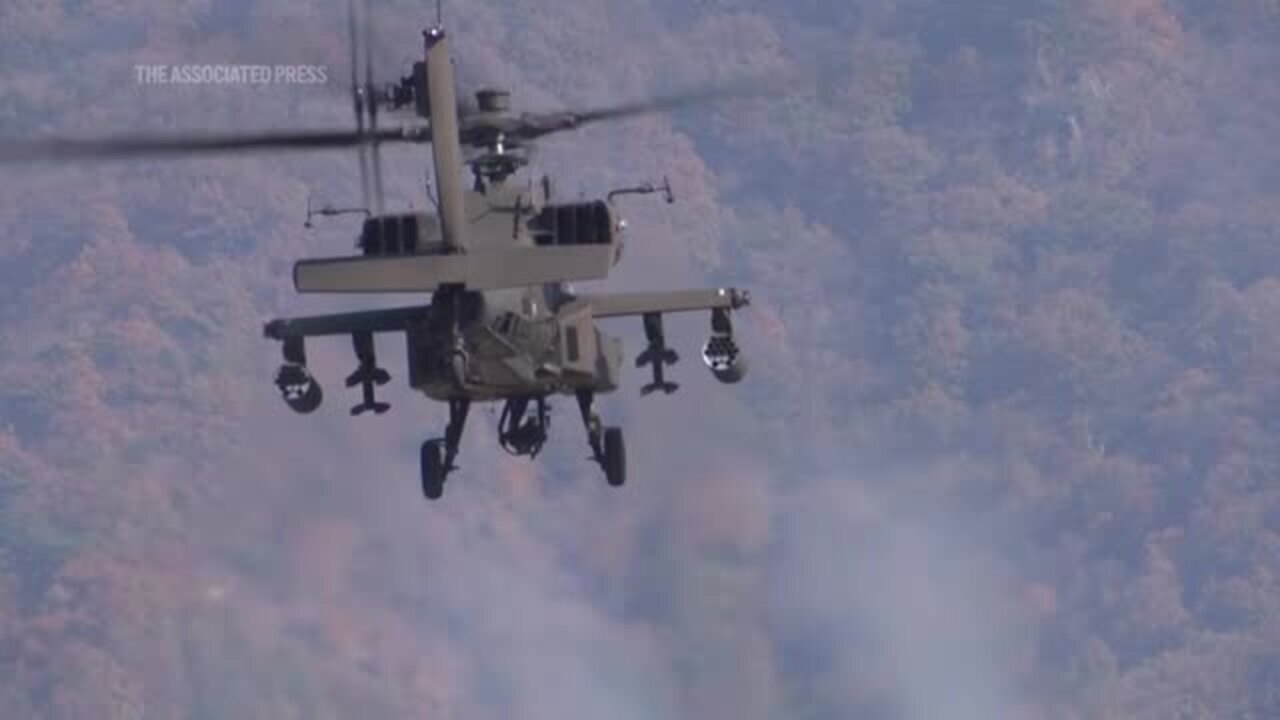The U.S. military ended 2014 with a barrage of airstrikes against the Islamic State in Iraq and Syria and created a series of boot camps for a new generation of Iraqi recruits to go on the offensive against the extremist group, Pentagon and Central Command officials said Wednesday.
Through Dec. 28, U.S. and coalition partners had conducted 1,522 strikes against the organization known as ISIS, using fighters, bombers, attack and remotely piloted aircraft, the Pentagon said.
The U.S. carried out a total of 1,237 attacks, including 656 in Iraq and 581 in Syria. Coalition aircraft conducted 285 strikes, including 215 in Iraq and 70 in Syria, the Pentagon said.
From Dec. 28 through Dec. 31, the coalition conducted another 43 airstrikes to bring the total for the year to about 1,565, Centcom said, or nearly 11 daily since President Obama authorized the strikes to begin on Aug. 8.
The missions were part of the "Iraq first" strategy endorsed by President Obama in the effort to "degrade and defeat" ISIS in Iraq and Syria.
Obama has barred a ground combat role for U.S. troops in the campaign that Gen. Martin Dempsey, chairman of the Joint Chiefs of Staff, has estimated would possibly take three or four years.
Currently, there are about 1,500 U.S. troops in Iraq and they have set up Joint Operations Centers in Baghdad and Irbil, capital of the Kurdish region, to advise local forces and coordinate the coalition air campaign that has been bolstered in recent weeks by the addition of Air Force A-10 Thunderbolt ground attack warplanes.
The U.S. troops have also been setting up boot camps in Iraq for a new generation of Iraqi recruits, with the goal of training 5,000 recruits every six weeks, the New York Times reported Wednesday.
The U.S. spent an estimated $25 billion training the Iraqi national security forces from 2003-2011, but that military essentially collapsed and abandoned its equipment in the face of the ISIS advance last summer that took over about one-third of the country.
Army Maj. Gen. Paul Funk, U.S. commander of the new training program, told the New York Times that the recruits "are new patriots of Iraq that have actually signed up, have been through basic training and are now ready to go through some advanced training."
Army Maj. Gen. Dana Pittard, the deputy to Army Lt. Gen. James Terry at the Combined Joint Task Force-Operation Inherent Resolve, said the U.S. trainers of the recruits were working off the following principle: "What are the bare minimum basics needed for counter-attacking?"
The recruiting, training and advising program was expected to go into high gear in late January when another 1,300 U.S. troops begin arriving in Iraq. The additional troops were authorized in November by President Obama and funding for their support was recently approved by Congress in the National Defense Authorization Act.
About 1,000 of the additional 1,500 troops will come from the 3rd Brigade Combat Team of the Army's 82nd Airborne Division based in Fort Bragg, N.C.
At a Pentagon briefing last week, Navy Rear Adm. John Kirby, the Pentagon press secretary, said that the overall training plan was to set up a total of 12 brigades – nine from Iraqi forces and three from the Peshmerga Kurdish forces -- capable of conducting offensive operations.
At a Dec. 18 Pentagon briefing, Lt. Gen. Terry said he expected coalition partners to contribute an additional 1,500 troops as trainers.
Terry said that the efforts of the Iraqi and Kurdish forces backed by coalition airstrikes had put ISIS on the defensive. "We are not seeing a broad offensive movement like we saw in May and June and even into July," he said.
There was also concern at the Pentagon and the White House over a separate and competing program from Iran to train and recruit Iraqi forces.
On Wednesday, the Iraqi and Iranian defense ministers met in Tehran to formalize an agreement on Iran's military support, Agence France Presse reported.
Iranian state television said that the defense ministers had "agreed to continue cooperation in the defense arena with the creation of a national army to protect the territorial integrity and security of Iraq."
Earlier this week, the Obama administration got some unexpected support for the efforts in Iraq from Sen. John McCain, R-Arizona, who will take over later this month as chairman of the Senate Armed Services Committee.
McCain, normally a harsh critic of the administration on national security, spoke to reporters at the U.S. Embassy in Baghdad following Christmas visits with the troops in Afghanistan and Iraq.
"We are literally doing everything that the Iraqi government has requested," McCain said. When asked about the administration's plan, he said, "I think it's a viable strategy here in Iraq."
White the U.S. training program for Iraqi recruits moves forward, the program to recruit and train from among so-called "moderates" in Syria to combat ISIS has yet to begin. Terry said "there's a separate task force being established to actually handle the train-and-equip peace" from among the Syria rebels that is being led by Army Maj. Gen. Michael Nagata, head of Special Operations at Centcom.
"I think a large part of that has been getting the legislation right to get the authorities and the funding," Terry said. Congress recently approved the $500 million for training Syrians that was requested by the White House last September but "recruiting and vetting has not yet begun," Kirby said.
The plan was to train about 5,000 troops annually at sites in Saudi Arabia and possibly Turkey for the new Syrian force.
Retired Marine Gen. John Allen, the special presidential envoy for coordinating the coalition against ISIS, said the situation had improved markedly since last June when ISIS fighters "poured down the Tigris Valley" capturing major cities and "Iraq was under siege, poorly governed and alone in the world."
In an article for Defense News, Allen said that the momentum of ISIS "has been halted and it is now constantly looking over its shoulder for the next attack."
However, "we cannot hope to defeat ISIL through military action alone," Allen said, using the Pentagon's preferred acronym for ISIS.
"We also cannot truly defeat ISIL for the long-term if we do not use this unique moment in history to take action as a community of nations to address the underlying political, economic and social issues that have allowed ISIL's toxic and destructive ideology to flourish," Allen said.
-- Richard Sisk can be reached at richard.sisk@military.com





























